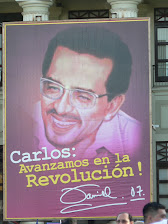 The dramatic appeal by the Venezuelan president Hugo
The dramatic appeal by the Venezuelan president HugoChávez, suggesting to the Farc guerrillas in Colombia that
it is time to release their hostages and to abandon the
armed struggle, is a serious challenge to the Colombian
government of Alvaro Uribe, which has long pursued a
military solution to a rural conflict that has lasted for
more than half a century. Chávez has often criticised the
Farc (the "Revolutionary Armed Forces of Colombia") for
their practice of seizing and holding civilian hostages,
but this is the first time that he has called for them to
give up fighting. "The guerrilla war has passed into
history," he said on Sunday during his regular weekly
television programme, and he again requested to Farc to
make "a grand humanitarian gesture" by releasing their
hostages. These are believed to number more than 700, and
include three US defence contractors and Ingrid Betancourt,
a French-Colombian citizen (and former presidential
candidate) in whom the French president Nicolas Sarkozy has
taken a personal interest.
In making his call, Chávez is clearly taking advantage of
the new situation created by the recent death of Manuel
Marulanda, the Farc's leader since the 1960s, as well as by
the probable arrival in the White House next January of
Barack Obama, who has promised fresh policies towards Latin
America, invoking the once seemingly progressive projects
of earlier Democrat presidents like Franklin Roosevelt (the
"Good Neighbour" policy) and John Kennedy (the "Alliance
for Progress"). A new US president, paying proper attention
to Latin America for the first time in 20 years, demands a
fresh response.

The Farc, whose origins go back to the Liberal-Conservativ e
civil war in Colombia of the 1940s and 1950s, was always
markedly different from the other Latin American guerrilla
movements, inspired by Che Guevara, that emerged in the
1960s in the wake of the successful Cuban revolution. A
genuine peasant-based army (as opposed to irregular bands
led by urban intellectuals) , the Farc believed in the
necessity of politicising the peasantry, rather as the
narodniks had tried to do in Russia in the 19th century.
But in Latin America, as I wrote nearly 40 years ago in my
book Guerrilla Movements in Latin America (republished this
month by the Seagull Press), "this type of activity is
impossible without gun in hand. Political agitation, the
organisation of peasant unions, and the holding of strikes
is often illegal. The power of local landowners, reinforced
by that of the state, is used to repress incipient signs of
rebellion."
_DCE.jpg)
Those conditions still exist in parts of Colombia, where
trade unionists remain under permanent threat and where
paramilitary units work hand in glove with landowners, yet
in the rest of Latin America the memory of Che Guevara is
now kept alive on T-shirts rather than through the
monstrous rattle of machine-guns that he had once (along
with Wilfred Owen) so poetically evoked. The task in
Colombia is to engineer a peace process that will allow the
guerrillas to lay down their arms, and guide the country
towards the kind of social peace (and democratic argument)
that now exists in most of the continent. That has been the
hope of Chávez, ever since he accepted Uribe's request last
year to help in obtaining the release of the Farc's
hostages (and the release of Farc prisoners in Colombian
jails).
The Farc has been much weakened in the past year,
with the loss of several senior figures as well as
Marulanda, and the current leadership may not have much of
a hegemonic grip over its fighters, making peace talks
difficult about anything more than a hostage/prisoner
exchange. Uribe has established a reputation as a tough and
unreliable negotiator, yet if he were to swallow his
hostility to Chávez, the only significant outside figure
with lines open to the Farc, and to come under pressure in
the new year from Washington, his only ally, the longest
war in Latin America could now be brought to an end.
This article was first published on guardian.co. uk on
Monday June 09 2008. It was last updated at 16:30 on June
09 2008. http://www.guardian .co.uk/commentis free/2008/ jun/09/venezuela .colombia



No comments:
Post a Comment